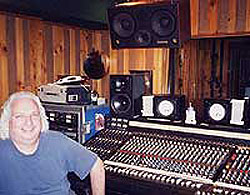
Bruce Borgerson: This is amazing. I’ve been in dozens of studios, many that have lots of vintage gear, but I’ve never seen anything like this. Like those Presto tape recorder electronics out there.
Shelly Yakus: Yeah, isn’t that amazing. You know, my dad had a studio in Boston, and we had those tape recorders.
I remember when we bought them new, and those tape recorders could make a 71/2 copy that was so good that you would have to stop the machine to know whether you were listening to the master or the copy.
BB: I’ve heard of them vaguely, but they must have gone out, what, by the late fifties?
SY: I would say they went out in the sixties, but I’m just guessing.
They didn’t make machines for very many years, they just couldn’t keep up with Ampex. But they were great machines, believe me. We used to use them every day at the studio.
BB: Was this at Ace?
SY: Yes, that was my dad’s studio.
BB: I checked that out on the internet, and I found out that Freddy Cannon did his first hits there.
SY: Right. A little trivia thing, here, do you know what his last name was?
BB: It was in that story, but I can’t recall.
SY: Freddy Picarello. He was a go-fer in the studio, when I was a kid. I used to go there on weekends and in the summer, and he would go for coffee. A lot of talent came out of Boston.
BB: So you were a studio kid?
SY: Yes. I remember being ten years old and asking my dad, “Can I learn how to cut a record?”
We had these Presto lathes, they were fixed pitch cutting lathes for lacquers, and we used to do a lot of that work, cutting lacquers for a 78 or a 45, for a local band project.
They would use those for demos and something to take home. So I remember he said to me, “Shelly, when you can see over the top of the tables, you can start cutting records.”
And that happened when I was about fourteen, when I started working there regularly on summers and weekends.
But the most important thing I learned there was how to listen. That’s what my dad gave me, that’s what that place gave me.
I remember the moment when I finally got it, and that was my foundation for everything I did after that. And I got a feel for the business.
But that business belonged to my dad and his brother. He wanted me to stay there and take it over from him, but the demand for quality in Boston wasn’t like it was in New York.
We used to get four track tapes in from New York, and I would hear them and they would sound just remarkable to me. It had a lot to do with the producers in New York saying to the engineer, “No, I’m not happy with that drum sound, let’s keep working on it.”
In Boston, they were happy with whatever you gave them. I didn’t see the chance for a whole lot of growth. So I left and went to New York and got a job there, at A&R.
